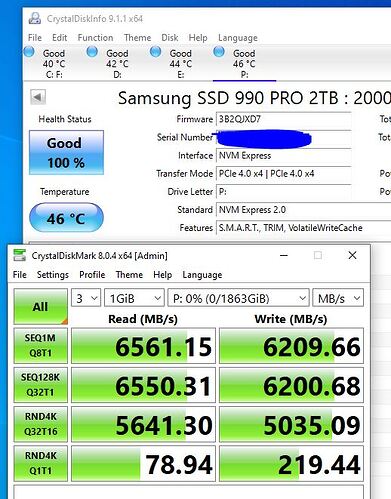On my X570, I am getting PCIe-4 speeds. However the Samsung 990 Pro from others benchmarks I see should be able to break 7000 MB/s SEQ Read
But I am consistently getting 6560 MB/s and while that is not bad its making me curious. Is it a Windows 10 vs 11 or a BIOS version?
So posting here to see if anyone with X570 on Windows 10 has similar results or better and where their setup differs from mine.
Test configuration:
Chipset: AMD X570 (Gigabyte Aorus Elite AX BIOS F4 w/ 5950X CPU)
OS: Windows 10 22H2 Build 19045.3324 (64-bit), clean install onto the Samsung 970 EVO
Win10 MS NVMe driver 10.09041.3155 (6-21-2006)
Tested NVMe SSDs:
a) 1TB Samsung 970 EVO (as system drive C:) - M2.SATA 1st slot CPU
b) 2TB Samsung 990 Pro (as storage drive P:) - M2.SATA 2nd slot Chipset
NOTE: D: and E: are just SATA drives
CDM set on NVMe SSD - Results:
